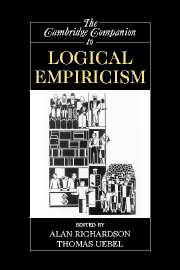Book contents
- Frontmatter
- Introduction
- Part I The Historical Context of Logical Empiricism
- Part II Logical Empiricism: Issues in General Philosophy of Science
- 4 Coordination, Constitution, and Convention: The Evolution of the A Priori in Logical Empiricism
- 5 Confirmation, Probability, and Logical Empiricism
- 6 The Structure of Scientific Theories in Logical Empiricism
- Part III Logical Empiricism and the Philosophy of the Special Sciences
- Part IV Logical Empiricism and its Critics
- Bibliography
- Index
- Series List
5 - Confirmation, Probability, and Logical Empiricism
from Part II - Logical Empiricism: Issues in General Philosophy of Science
Published online by Cambridge University Press: 28 January 2008
- Frontmatter
- Introduction
- Part I The Historical Context of Logical Empiricism
- Part II Logical Empiricism: Issues in General Philosophy of Science
- 4 Coordination, Constitution, and Convention: The Evolution of the A Priori in Logical Empiricism
- 5 Confirmation, Probability, and Logical Empiricism
- 6 The Structure of Scientific Theories in Logical Empiricism
- Part III Logical Empiricism and the Philosophy of the Special Sciences
- Part IV Logical Empiricism and its Critics
- Bibliography
- Index
- Series List
Summary
THE HYPOTHETICO-DEDUCTIVE METHOD
Confirmation and probability are the objects of much attention on the part of logical empiricists. In the first place, confirmation is connected with the ideal represented by the hypothetico-deductive (H-D) method, reflecting the idea that scientific knowledge results from the interplay of laws, advanced by way of hypotheses, and singular statements regarding observational findings. Only well-established scientific laws allow for the application of the H-D method and can provide a sound basis for prediction and explanation. Most logical empiricists regard confirmation as the natural candidate for establishing scientific laws. Another candidate is corroboration, embraced by Popper contra logical empiricism.
A lucid description of the interplay between laws and observational statements, which is at the core of the H-D method, is to be found in the following passage by Hans Hahn, anticipating the notion of corroboration:
laws of nature are hypotheses which we state tentatively; but in stating such laws of nature we implicitly state many other propositions . . . as long as these implicitly stated propositions . . . are confirmed by observation, the laws of nature are corroborated and we continue to hold on to them; but if these implicitly asserted propositions are not confirmed by observation, the laws of nature are not corroborated and we go on to replace them by others.
(Hahn 1933a/1987, 38)- Type
- Chapter
- Information
- The Cambridge Companion to Logical Empiricism , pp. 117 - 135Publisher: Cambridge University PressPrint publication year: 2007
- 2
- Cited by



